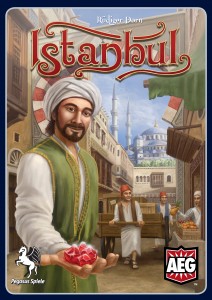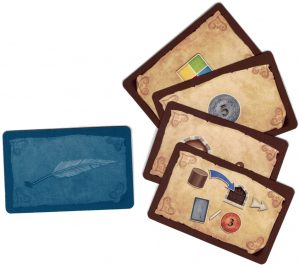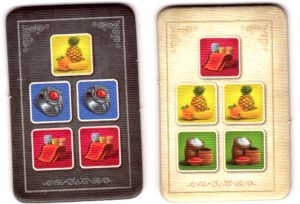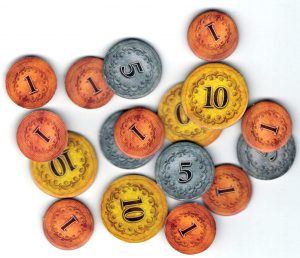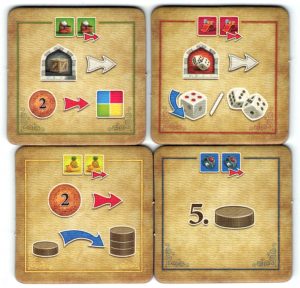Istanbul – A Lesson in Efficiency

I first played Istanbul at Atlanta Game Fest last year. It’s Euro-style play, colorful tiles and bits, and puzzley immersive play quickly enraptured my mind. After many plays since, I’ve decided that Istanbul boils down to a lesson in efficiency. Let’s see why.
In Istanbul, your mission, should you choose to accept it, is to be the first to acquire 5 rubies (6 in a two-player game). Playing a merchant with a retinue of assistants, and the occasional help of your drunk uncle, in the bustling market of Istanbul, you must find the means to accomplish your goal quickly and efficiently. Of course, your opponent merchants are likewise vying to be the first to acquire 5 rubies and will often get in your way, forcing you to pay a little more to perform a task or choose another means to accomplish your goal.
There are a number of ways for you to acquire your crimson jewels. You can:
- Buy rubies outright at the Gemstone Dealer – of course that will require some lira – the currency used in Istanbul.
- Trade goods for rubies at the Sultan’s Palace. To acquire enough goods, you may have to expand the capacity of your wheelbarrow – which takes lira – and, of course, acquire the Sultan’s desired goods.
- Acquire a ruby from the Wainwright as a reward for fully expanding your wheelbarrow. Each wheelbarrow extension costs 7 lira. It takes three extensions to fully upgrade your wheelbarrow.
- Earn a ruby from the Small Mosque and/or the Great Mosque by fulfilling two orders. Each mosque also grants two rewards for serving them.
Most players will use a variety of these methods to complete their ruby quota.
Game Setup
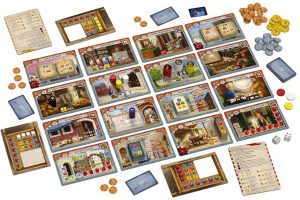
Istanbul components
Istanbul has a modular board made up of 16 tiles placed in a 4×4 grid. There are three ways you can set up the tiles:
- Short Paths – Place the tiles in numeric order by the blue (right) number in the top left corner of the tiles. This creates short paths among the most important places on the board, making for a simpler, easy game. Short Paths is a good choice for your first game or anytime you want a quick game.
- Long Paths – Place tiles in numeric order by the green (left) number. This puts establishments that work well together further apart, forcing you to plan more carefully. The Long Paths setup is more challenging and a good choice for experienced players.
- Random Layout – Place the tiles in any random order, with two caveats: the Fountain must be in one of the four interior positions and the Tea House and Black Market must be at least 3 places away from each other. You never know what you’ll get with this setup, making it an exciting option that offers lots of replayability.
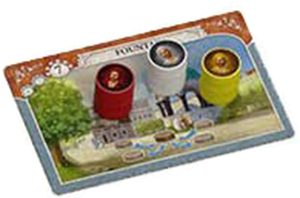
Merchant/assistant stacks on Fountain
Once the tiles are in place, distribute the appropriate number of rubies on the board according to rules and number of players, and place the Mail tokens on the top 4 spaces of the Post Office. Roll the dice to randomly place the Governor and Smuggler. Shuffle the Caravansary Bonus cards and deal one to each player, placing the rest on the Caravansary.
Each player places their drunk uncle in the Police Station and their merchant and four assistant disc – merchant on top – on the Fountain, takes a reference card and a wheelbarrow, and sets their goods trackers to zero.
Choose a start player and give that player 3 lira, the next player clockwise 4 lira, the next 5, etc. Then you’re ready to play.
Game Play
On your turn:
- You must move orthogonally 1 or 2 spaces (some cards let you break this rule).
- You may perform an action.
- If the governor, smuggler and/or any drunk uncles (family members) are there, you may interact with them.
As a rich merchant, it would be inappropriate for you to pick up or deliver items yourself – that’s what your assistants are for. So, to perform an action in the city, you’ll pick up your entire stack of playing pieces, which represent you and your assistants, and move it to another tile 1 to 2 spaces away, either dropping off an assistant (disc) to do your bidding or picking one up (adding it to the bottom of your stack). If you ever find yourself alone, without help, you’ll have to pick up an assistant at a nearby tile to perform an action – or return to the Fountain and call your retinue back. It’s a very cool mechanism.
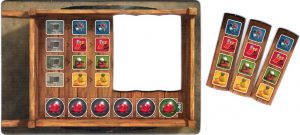
Buy wheelbarrow extensions at the Wainwright.
Each place (tile) you visit provides an action:
- Wainwright (1). Pay 7 lira to add one extension to your wheelbarrow. You can only buy one extension per visit unless you have a Bonus card that allows you to do otherwise. After your third, and final wheelbarrow upgrade, you earn a ruby.
- Warehouses (2,3,4). There are three warehouses where you can fill your cart with goods: Cloth, Spices or Fruit. When you visit a warehouse, fill your wheelbarrow to capacity with that good (move the appropriate goods token to the last space on that goods track in your wheelbarrow). The more wheelbarrow extensions you have, the more goods of that type you can pick up on one visit.
- Post Office (5). Take the goods and coins pictured on the 4 uncovered spaces, then move the leftmost Mail token to the bottom row to set the next offering. If all of the tokens are on the bottom row, move them all back to the top row.
-

Sample Caravansary cards
Caravansary (6). Take two Bonus cards, either from the top of the deck or discard pile or one from each. Then return one card face up to the discard pile. It could be one you already had or one of the cards you just picked up. Bonus cards provide a one-time benefit or action. Your reference card describes all of them in detail.
- Fountain (7). Recall all of your assistants. You don’t have to pick up or drop off an assistant to perform this action. You also don’t have to pay any other merchants for the privilege of resting at the Fountain, but you may have other encounters.
-

Sample market Demand tiles
Black Market (8). Take 1 good – cloth, spice or fruit – then roll the dice and you may get some jewelry, too. (Red Mosque tile applies.)
- Tea House (9). Call a number between 3 and 12. Roll the dice. If you rolled your number or higher, you get your number of lira. Otherwise, take 2 lira. (Red Mosque tile applies.)
- Markets (10 & 11). There are two Markets: Small Market and Large Market. The Large Market demands higher valued goods, but pays more money. Markets buy only the specific goods shown on the top Demand tile. Sell 1 to 5 of those goods to the market and take the appropriate amount of lira – depends on number of goods sold. Move the current Demand tile to the bottom of the stack to reset the Market.
-

Istanbul’s lira coins
Police Station (12). Send your drunk uncle to run an errand for you at any location. He does not have encounters with anyone there – merchants, governor, smuggler, or other drunk uncles.
- Sultan’s Palace (13). Deliver all of the goods shown and take the next ruby.
- Mosques (14 & 15). There are two mosques: Small Mosque and Great Mosque. If you have the requisite number & type of good depicted on one of the top Mosque tiles in your wheelbarrow, donate one good of that type to the mosque in exchange for the Mosque tile. Each Mosque tile grants a bonus or special ability for the rest of the game. When you’ve acquired both of the tiles offered at a mosque, you earn a ruby.
-

Sample Mosque tiles. Each subsequent tile in a stack requires 1 additional good of that type in your wheelbarrow to acquire. You still only pay 1.
Red/Cloth Small Mosque Tile – When rolling dice at the Black Market or Tea House, you can change one die to a 4 or reroll both dice once.
- Green/Spice Small Mosque Tile – Whenever you visit a Warehouse, you may additionally pay 2 lira to purchase any one good.
- Blue/Jewelry Large Mosque Tile – You immediately receive a fifth assistant.
- Yellow/Fruit Large Mosque Tile – During your turn, you may pay 2 lira to recall one assistant from any location.
-
- Gemstone Dealer (16). Pay the highest visible price in lira and take the next ruby.
Encounters
Should you ever visit an establishment already occupied by one or more of your fellow merchants, you must pay those merchants 2 lira each for interrupting their appointment at said establishment. If you cannot pay them or choose not to pay them, your turn ends immediately – you don’t get to take an action or have any other encounters.
Whenever you meet the Governor – or as we like to say, “Gov’na” – you may take one Bonus card from the top of the Caravansary deck and return that card or another Bonus card to the discard pile or simply pay 2 lira to keep it. Then roll the dice to send him on his merry way (determine which tile he moves to next).
When you run across the Smuggler, you can exchange one good with him or pay 2 lira for any one good. Roll the dice to move him along.
Should you encounter another player’s drunk uncle (family member), you immediately receive a reward for sending him back to jail: either a card from the Caravansary deck or 3 lira – your choice.
My Thoughts
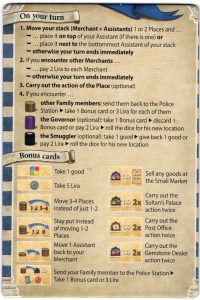
Player reference card
I love Istanbul. The modular board tiles with their rich artwork are a delight to behold. The wooden bits and sparkly rubies are simple and utilitarian, yet fit their designated spaces perfectly. My only gripe is the Caravansary board. There’s just enough room on the tile for a draw pile and a discard pile, but only one space is provided. The player reference cards are very handy and help make Istanbul easy and quick to teach and learn.
Game play is simple and straight forward. Turns are super quick, so there’s not much downtime between your turns. The game play is more strategic than usual in a game with such short, quick turns.
Efficient use of your moves dropping off and picking up assistants is certainly one of the keys to success, making Istanbul a very puzzley game. Your fellow players can often foil your best made plans, though – whether inadvertently or on purpose – by moving to an establishment you were about to visit. Now you have to pay your opponent to go there – assuming you can afford to – or do something else in the meantime. Grrr.
The replayability is excellent. The modular board means a new configuration in every game when you use the Random Layout setup. We almost always play with a Random Layout.
Don’t underrate the Bonus cards from the Caravansary or the Mosque tiles. Grabbing one or more Mosque tiles early in the game can be quite helpful. I like to get the Red/Cloth Mosque tile early for the bonus to my dice rolls. The Blue/Jewelry Tile and the Yellow/Fruit Tile are also really nice: letting you shop longer before returning to the Fountain to recall your assistants. Of course, you’ll want to adjust your strategy depending on what your fellow players are doing. It’s often better to do something different.
Variants and Pimping
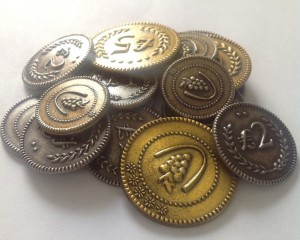
These metal coins, a Tuscany Prima Kickstarter add-on, look great in Istanbul!
Photo courtesy of Stonemaier Games.
Istanbul’s rulebook includes rules for a tactical variant when playing with 2 to 4 players. During setup, replace your bottom most Assistant with a neutral color disc (white or the unused player color). Whenever you end your movement at a Place with a neutral Assistant, you can pick him up as if he were your own. You can have multiple neutral Assistants in your stack at one time. However, at the Fountain, you can only recall Assistants of your own color.
Oopsey. Re-reading the rules while writing this, I just noticed it says “replace”. When I was taught the game, we added a neutral assistant to everyone’s stack. I think we’ve always played that way.
I even added some natural wood discs to my copy of Istanbul, so we could play the variant with 5 players. Apparently I created my own variant by adding an assistant to everyone’s stacks, instead of replacing one. I can tell you from experience that it works perfectly fine.
Some other ways I pimped my personal copy of Istanbul:
- Replaced the cardboard coins with lovely metal coins. When I participated in the Tuscany Prima Kickstarter, I purchased extra sets of the coins. Turns out they’re perfect for Istanbul – even the right currency: lira. I used one and half sets.
- Added a black faux-leather dice bag to hold the coins. Gotta have a pretty way to store them.
- Found a plush red velvet bag for the rubies.
- Added 5 neutral discs as described above.
- Acquired some small muslin bags to use as player bags. I found the muslin bags when I was shopping for something to put the coffee beans from the Mocha & Baksheesh expansion in.
You can tell I like the game. I only bother to pimp my favorites.
Expansions
Speaking of the expansion: Istanbul: Mocha & Baksheesh. I’m still on the fence about it. It adds four new Places to the game, new Guild cards and a new good type, but in my plays so far, the Guild cards seem too overpowered.
There’re so many features in the expansion, though, that I’d rather cover it in a separate review. I am, however, looking forward to the next expansion, Istanbul: Letters & Seals, which is due out any day now – at least in Europe. Not sure how long before it will hit the U.S.
Honors:
I’m not the only one singing Istanbul’s praises. Since its release, Istanbul has earned numerous honors, including:
- 2015 Nederlandse Spellenprijs Best Expert Game Nominee
- 2014 Swiss Gamers Award Winner
- 2014 Meeples’ Choice Nominee
- 2014 Kennerspiel des Jahres Nominee & Winner
- 2014 International Gamers Award – General Strategy: Multi-player Nominee
- 2014 Hra roku Nominee
- 2014 Gouden Ludo Nominee & Winner
- 2014 Golden Geek Board Game of the Year Nominee
- 2014 Golden Geek Best Strategy Board Game Nominee
- 2014 Golden Geek Best Family Board Game Nominee
Summary
Istanbul is an excellent medium-light Euro-style strategy game for 2 to 5 players ages 10 and up. Play time runs 40 to 60 minutes – a little longer if players don’t think about what they’re going to do until their turn comes around. Game play is simple and straightforward. The excellent player reference cards help make it easy to teach and learn. Finding the most efficient means of accumulating your ruby quota will take a little more time and experience – a lesson in efficiency so to speak.
Copyright © 2016 by Tina G. McDuffie. All rights reserved.
Cover background photo courtesy of Jana Spain.

